Interview: Adam Goldberg On His New Film (Untitled), Static Art World Culture, And Kicking The Bucket
When it comes to a working actor who humorously perfects the modern guy as a hip scepter for perpetual thought and frazzled irritation, Adam Goldberg holds the key to today's conflicted kingdom. Like his characters dating back to a break out role in Dazed and Confused and on to an ace performance in 2007's 2 Days in Paris (a rare romantic comedy that is meaningful and tolerable), part of Goldberg's charm seems channeled via friendly reluctance. He continues to mine such neurotic territory playing the lead in (Untitled), a surprisingly accessible quasi-satire of the contemporary New York art world.
Portraying a struggling artist named Adrian Jacobs who composes abstract atonal music—and weighs suicide at age 30 for the sake of integrity—Goldberg captures, often in silence, the nagging doubts and petty contradictions of a personality burdened by the mythical qualifiers for "real art" and the "true artist." Standing in face of this absorbed ethos is Adrian's brother, who rakes in tons of dough and a thick coat of normalcy with abysmal paintings sold to tasteless lobbies all over the world. (Untitled) features a romantic subplot that's distracting and predictable, but watching Goldberg maintain composure alongside absurd (and absurdly rich) artists, especially a hustler played by the Vinnie Jones, will ring true throughout any metropolitan art scene. Goldberg talked with /Film about his opinions on the character, his fabled performance as The Hebrew Hammer, and what he's been up to at home, and totally content, in Los Angeles.
Hunter Stephenson: Hi Adam. What surprised me most about (Untitled) is that it doesn't pander directly to New York audiences. It's more accessible, almost like a mainstream movie that skewers an elitist niche. Would you agree with that? And are you surprised by how few comedies have examined the art world?Adam Goldberg: Yeah, a few people have compared it to Art School Confidential, but I guess there aren't many films about the art world. And obviously, it's set in New York for practical reasons because that's the most symbolic place, but it didn't really even need to take place contemporarily. It's really has an anywhere-anytime sort of vibe, because it's about these loftier ideas, like "What is art?" and "What is music?" And, you know, what is the value of something and how things are valued. So, it's definitely not indigenous to New York culture. A lot of the music my character makes in the film is actually based on what people were doing in the late '60s and early '70s, which is funny because my character fancies himself being on the cutting edge and new school. But it's hardly revolutionary.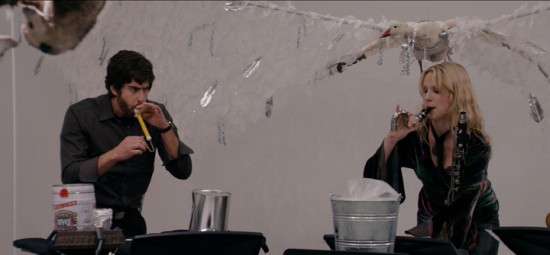 Is there any aspect to your character, Adrian, that you would consider a hustler or opportunistic, if only subconsciously?Adam Goldberg: No. [laughs] The opposite. I think he errs on the side of being an elitist and therefore, he's judging his own worth on the fact that he's not trying to obtain mainstream success. And he would feel he somehow failed if he did achieve that; but then, ironically, he's constantly complaining that he doesn't have mainstream success. So, he's one of these guys you see who, I think, has built himself into a corner [creatively and socially].Can you discuss the opposites and similarities between you and your brother (Eion Bailey) in the film? Your characters are on opposing ends of the art world and are physically opposite, but you both have beards and similar tempers. At one point, I wondered if your brother could figuratively exist inside Adrian's head...almost like he's arguing with his complete opposite or his greatest fear. Did you see it like that?Adam Goldberg: There's definitely a dualism there, but it's the kind of classic archetypal thing where each character has what the other one wants. You know? In a sense, Eion's character wants to be considered a great artist and my character resents the fact that his brother is so successful for doing something he deems unworthy of it. So, it's totally a duality, but certainly not imaginary. It is archetypal. It's not a doppleganger movie, but they are two sides of the same coin, for sure. I definitely know siblings who are a lot like that.
Is there any aspect to your character, Adrian, that you would consider a hustler or opportunistic, if only subconsciously?Adam Goldberg: No. [laughs] The opposite. I think he errs on the side of being an elitist and therefore, he's judging his own worth on the fact that he's not trying to obtain mainstream success. And he would feel he somehow failed if he did achieve that; but then, ironically, he's constantly complaining that he doesn't have mainstream success. So, he's one of these guys you see who, I think, has built himself into a corner [creatively and socially].Can you discuss the opposites and similarities between you and your brother (Eion Bailey) in the film? Your characters are on opposing ends of the art world and are physically opposite, but you both have beards and similar tempers. At one point, I wondered if your brother could figuratively exist inside Adrian's head...almost like he's arguing with his complete opposite or his greatest fear. Did you see it like that?Adam Goldberg: There's definitely a dualism there, but it's the kind of classic archetypal thing where each character has what the other one wants. You know? In a sense, Eion's character wants to be considered a great artist and my character resents the fact that his brother is so successful for doing something he deems unworthy of it. So, it's totally a duality, but certainly not imaginary. It is archetypal. It's not a doppleganger movie, but they are two sides of the same coin, for sure. I definitely know siblings who are a lot like that.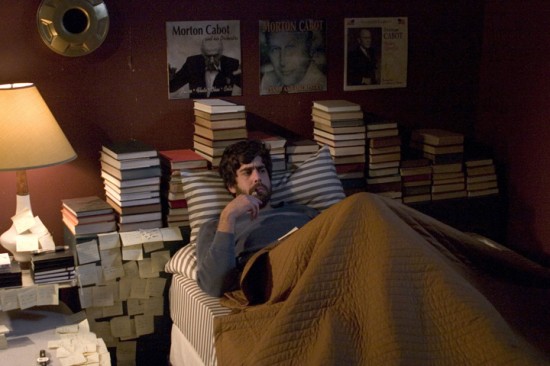 Yeah. [laughs] I should clarify and say I didn't mean in a literal way, like Charlie Kaufman. There's a funny but dark scene where your character is using pills to make, like, a makeshift maraca. Is that scene implying that all of those pills are Adrian's?Adam Goldberg: Uh, yeah. [laughs] Well, I don't think it's clear. He's probably using the pills just to make a shaker. You know, I think it's subject to interpretation. But there's lots of little things that [director] Jonthan [Parker] did in the film like that. Like, there's a scene where Jonathan starts with a close shot and zooms out, or you think I'm writing music but I'm really turning the page. You know, I like to leave those things open. Those things are left to the audience.How much time did you spend on perfecting the art of kicking a bucket and how much input did you have in the music that Adrian creates?Adam Goldberg: [laughs] I didn't work so hard on the bucket part, but David Lang, who did the soundtrack, he did a bunch of the music that we were meant to play. And you see some of that in the first scene, but it was so difficult to play in a pre-recording, because [Lang's songs] were so non-structured and outlandish; we got the basic idea and we'd riff on our own. We'd use David's concepts and then we'd improvise. And I don't necessarily get Adrian's music as a whole but I get aspects of it. There are certain things I've done, using found objects in music, and even hammering strings on a piano for instance, which is something that David had done, but something I had also done. But, you know, I did it for a dissonant sound in a melodic context in my music. So, I certainly get being obsessed with certain sounds and samples and found objects, but not so much for creating totally atonal music [like Adrian's].
Yeah. [laughs] I should clarify and say I didn't mean in a literal way, like Charlie Kaufman. There's a funny but dark scene where your character is using pills to make, like, a makeshift maraca. Is that scene implying that all of those pills are Adrian's?Adam Goldberg: Uh, yeah. [laughs] Well, I don't think it's clear. He's probably using the pills just to make a shaker. You know, I think it's subject to interpretation. But there's lots of little things that [director] Jonthan [Parker] did in the film like that. Like, there's a scene where Jonathan starts with a close shot and zooms out, or you think I'm writing music but I'm really turning the page. You know, I like to leave those things open. Those things are left to the audience.How much time did you spend on perfecting the art of kicking a bucket and how much input did you have in the music that Adrian creates?Adam Goldberg: [laughs] I didn't work so hard on the bucket part, but David Lang, who did the soundtrack, he did a bunch of the music that we were meant to play. And you see some of that in the first scene, but it was so difficult to play in a pre-recording, because [Lang's songs] were so non-structured and outlandish; we got the basic idea and we'd riff on our own. We'd use David's concepts and then we'd improvise. And I don't necessarily get Adrian's music as a whole but I get aspects of it. There are certain things I've done, using found objects in music, and even hammering strings on a piano for instance, which is something that David had done, but something I had also done. But, you know, I did it for a dissonant sound in a melodic context in my music. So, I certainly get being obsessed with certain sounds and samples and found objects, but not so much for creating totally atonal music [like Adrian's].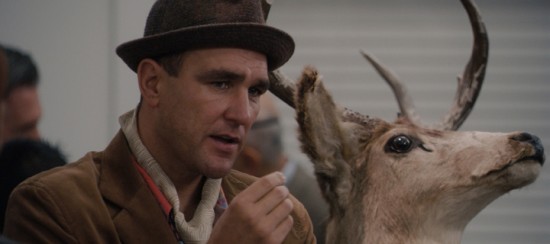 I like the introduction in the film of Adrian to Vinnie Jones's character, but also to this idiot-savant artist—he's really a hack—who makes art by doing things like placing a thumb tack on a bare wall. That's it. And Adrian's reaction—it's almost like psychological violence. Have you ever viewed a piece of "art" that made you want to kick it off the wall and start punching it on the ground?Adam Goldberg: [Coughs] I'm fairly open minded. [laughs] I've definitely seen stuff that I had no reaction to, that is supposed to elicit a reaction, and I've felt apathetic about and not sympathetic. But that scene is about the fact that Adrian sees himself in this artist, and totally resents it. He lacks so much self-awareness that in fact he doesn't see it. What he sees is a bunch of bullshit. But obviously, it turns into this moment of self-loathing, because he realizes that he also uses all of these posted notes and he uses a bucket. His work is really minimalist and he doesn't like that [Marley Shelton's curator character who is Adrian's fling] is comparing them, because he's sort of self righteous.
I like the introduction in the film of Adrian to Vinnie Jones's character, but also to this idiot-savant artist—he's really a hack—who makes art by doing things like placing a thumb tack on a bare wall. That's it. And Adrian's reaction—it's almost like psychological violence. Have you ever viewed a piece of "art" that made you want to kick it off the wall and start punching it on the ground?Adam Goldberg: [Coughs] I'm fairly open minded. [laughs] I've definitely seen stuff that I had no reaction to, that is supposed to elicit a reaction, and I've felt apathetic about and not sympathetic. But that scene is about the fact that Adrian sees himself in this artist, and totally resents it. He lacks so much self-awareness that in fact he doesn't see it. What he sees is a bunch of bullshit. But obviously, it turns into this moment of self-loathing, because he realizes that he also uses all of these posted notes and he uses a bucket. His work is really minimalist and he doesn't like that [Marley Shelton's curator character who is Adrian's fling] is comparing them, because he's sort of self righteous.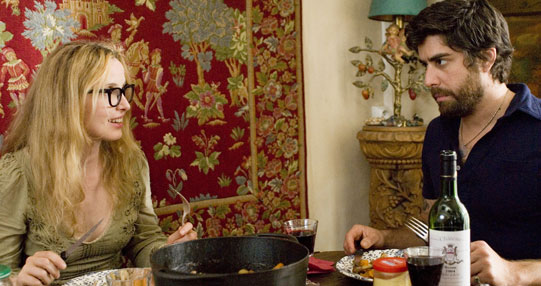 With many of your characters, an obvious exception being Stanely Mellish in Saving Private Ryan, I'm curious to see what happens to them after a movie is over. For instance, your character here and in Julie Delpy's 2 Days in Paris (above). Do you look for that quality or aspire to bring that? Many of your characters seem to have outlooks on life that overtake or are more interesting than the situations they're in. Agree?Adam Goldberg: See, now (Untitled) is one of those cases where I would definitely be interested and curious in seeing what happens to this guy. You know, is it something where he attempts to do something like Morton Cabot, the mentor he goes to see a performance of for his 90th birthday? Where he's using these musical elements that he's started using...but he's now using them in a hypnotic, melodic way? And I would like to see if this guy goes that way or if continues on his path of total self-righteous exclusivity and indignation. All of that. You know, I like the fact that there's a tiny arc to the guy and maybe a small change, but it's left up to the audience as to whether it's overt or not. It's pretty rare to do a sequel to a movie like this. [laughs] I definitely like the idea that it stimulates some thought.Looking back, what are your feelings on The Hebrew Hammer? It's become a character that people seem to remember fondly even though the film didn't take off...Adam Goldberg: I'm totally proud of that movie, you know? It was definitely, it felt like a gamble, but it was also fun to do and it would have been silly not to do it. It was something that was offered to me and I remember reading the script and laughing a lot. It's such a small movie, and it came out in a such weird way; it only played in a couple of movie theaters, so people mainly knew it from Comedy Central and DVD. I mean, today I think it has a cult following but it was a small release.
With many of your characters, an obvious exception being Stanely Mellish in Saving Private Ryan, I'm curious to see what happens to them after a movie is over. For instance, your character here and in Julie Delpy's 2 Days in Paris (above). Do you look for that quality or aspire to bring that? Many of your characters seem to have outlooks on life that overtake or are more interesting than the situations they're in. Agree?Adam Goldberg: See, now (Untitled) is one of those cases where I would definitely be interested and curious in seeing what happens to this guy. You know, is it something where he attempts to do something like Morton Cabot, the mentor he goes to see a performance of for his 90th birthday? Where he's using these musical elements that he's started using...but he's now using them in a hypnotic, melodic way? And I would like to see if this guy goes that way or if continues on his path of total self-righteous exclusivity and indignation. All of that. You know, I like the fact that there's a tiny arc to the guy and maybe a small change, but it's left up to the audience as to whether it's overt or not. It's pretty rare to do a sequel to a movie like this. [laughs] I definitely like the idea that it stimulates some thought.Looking back, what are your feelings on The Hebrew Hammer? It's become a character that people seem to remember fondly even though the film didn't take off...Adam Goldberg: I'm totally proud of that movie, you know? It was definitely, it felt like a gamble, but it was also fun to do and it would have been silly not to do it. It was something that was offered to me and I remember reading the script and laughing a lot. It's such a small movie, and it came out in a such weird way; it only played in a couple of movie theaters, so people mainly knew it from Comedy Central and DVD. I mean, today I think it has a cult following but it was a small release.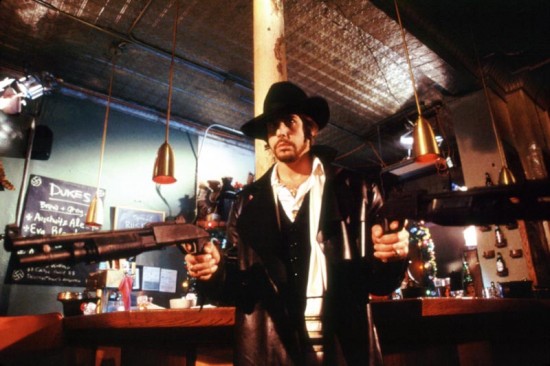 Right. Did you really lose a lot of sleep living near Rhianna when the Chris Brown stuff went down?Adam Goldberg: [laughs] No...not really. No. That video [linked above] was Jonathan, our director's suggestion. He thought it would be funny. He thought it would be good for the movie if I set up my five favorite places in Los Angeles, and I love Los Angeles. [laughs] I've been here my entire life. So, that was mainly a joke.Gotcha. Do you have any favorite galleries in L.A. and do you attend art shows in the city?Adam Goldberg: Well, I used to spend a lot of time when I was a kid going to galleries. I was exposed to a lot of art through my mother and my father, who were big art fans. And my stepfather has run this arts organization for years here, which is a nonprofit arts organization. So, I was exposed to a lot of different and interesting performance art and conceptual art and, you know, traditional galleries. I used to go to the Gagosian Gallery with my dad a lot. So, I saw a lot of great things and had a lot of fun, but as I get older I guess I'm not as interested in it. This film is sort of like when you do a parody of the film industry; there are elements that are obviously completely ridiculous, and then there are parts of it that are great and familial and produce really interesting things. So, this is really about that one aspect of the scene. There's going to be good art and bad, just like movies or music. There's an element where there's a weird bubble, like in the fashion world, maybe. There's not as much self awareness, you're creating stuff for that world rather than a larger audience, so it can appear ridiculous to people who just come into that bubble.Do you still consider directing to be your biggest passion within the industry?Adam Goldberg: Yeah, it is. But it takes me a long time. And as the years go on I realize how much work it entails. I used to be more enthusiastic about the idea of making something as fast as I could. Or, you know, if I felt I had something to say that day, I'd put everything into that. But I've been toying with a lot of different ideas over the last few years and really trying to figure out what the best approach for what I do next is, you know?
Right. Did you really lose a lot of sleep living near Rhianna when the Chris Brown stuff went down?Adam Goldberg: [laughs] No...not really. No. That video [linked above] was Jonathan, our director's suggestion. He thought it would be funny. He thought it would be good for the movie if I set up my five favorite places in Los Angeles, and I love Los Angeles. [laughs] I've been here my entire life. So, that was mainly a joke.Gotcha. Do you have any favorite galleries in L.A. and do you attend art shows in the city?Adam Goldberg: Well, I used to spend a lot of time when I was a kid going to galleries. I was exposed to a lot of art through my mother and my father, who were big art fans. And my stepfather has run this arts organization for years here, which is a nonprofit arts organization. So, I was exposed to a lot of different and interesting performance art and conceptual art and, you know, traditional galleries. I used to go to the Gagosian Gallery with my dad a lot. So, I saw a lot of great things and had a lot of fun, but as I get older I guess I'm not as interested in it. This film is sort of like when you do a parody of the film industry; there are elements that are obviously completely ridiculous, and then there are parts of it that are great and familial and produce really interesting things. So, this is really about that one aspect of the scene. There's going to be good art and bad, just like movies or music. There's an element where there's a weird bubble, like in the fashion world, maybe. There's not as much self awareness, you're creating stuff for that world rather than a larger audience, so it can appear ridiculous to people who just come into that bubble.Do you still consider directing to be your biggest passion within the industry?Adam Goldberg: Yeah, it is. But it takes me a long time. And as the years go on I realize how much work it entails. I used to be more enthusiastic about the idea of making something as fast as I could. Or, you know, if I felt I had something to say that day, I'd put everything into that. But I've been toying with a lot of different ideas over the last few years and really trying to figure out what the best approach for what I do next is, you know?
With I Love Your Work, which was the last movie I made [released in 2003], there was a lot of stuff that had gone on after we made the film about who owned the movie and who owned the rights. There was a lot of political and weird bullshit that went on, and there was this company that it turned out had the rights to the film. And I didn't realize they did, and they wanted to dump it to DVD and I fought really hard just to get into theaters, even briefly. Because, I mean, I like the idea that movies are meant to be seen on that screen. Even for a moment.
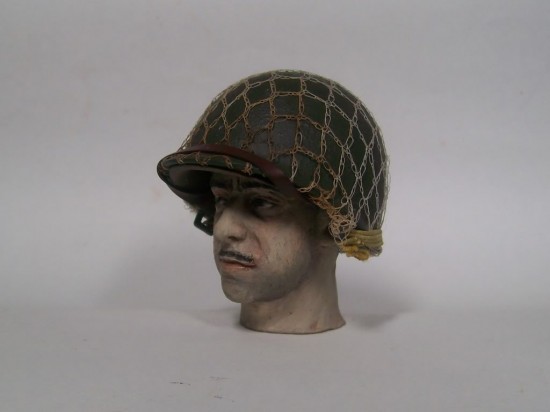 Right. It's a tough business. Thanks for doing the chat. What's up next?Adam Goldberg: I've been really immersed in writing and stuff like that. And I've been watching a lot of documentaries lately, like The September Issue and the new Michael Moore doc. I'm really just looking at things that are relevant to what I'm working on. I started to make this thing, a proposed pilot, about a tattoo artist of mine, we shot it like half-documentary and half-anthology. Documentaries interest me, but I'm really trying to flush out some of these narrative movies. I just did this animated feature [A Monster in Paris, Un monstre à Paris], this movie that's being made in France that's being produced by Luc Besson and the director is [Bibo Bergeron], who did Shark Tale. It's pretty cool, sort of an old fashioned animated feature, the backdrops are very classic. I just did the voices a few months ago, it's going to be really neat. Other than that, I've just been working on music stuff. I go through these phases, like I said, where I get immersed in what I'm doing.Hunter Stephenson can be reached at h.attila/gmail and on twitter.
Right. It's a tough business. Thanks for doing the chat. What's up next?Adam Goldberg: I've been really immersed in writing and stuff like that. And I've been watching a lot of documentaries lately, like The September Issue and the new Michael Moore doc. I'm really just looking at things that are relevant to what I'm working on. I started to make this thing, a proposed pilot, about a tattoo artist of mine, we shot it like half-documentary and half-anthology. Documentaries interest me, but I'm really trying to flush out some of these narrative movies. I just did this animated feature [A Monster in Paris, Un monstre à Paris], this movie that's being made in France that's being produced by Luc Besson and the director is [Bibo Bergeron], who did Shark Tale. It's pretty cool, sort of an old fashioned animated feature, the backdrops are very classic. I just did the voices a few months ago, it's going to be really neat. Other than that, I've just been working on music stuff. I go through these phases, like I said, where I get immersed in what I'm doing.Hunter Stephenson can be reached at h.attila/gmail and on twitter.
